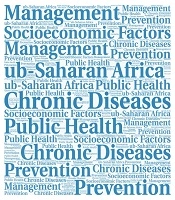Dear Editor,
Sub-Saharan Africa faces a growing burden of chronic diseases, including cardiovascular diseases, diabetes, cancer, and respiratory illnesses (1-3). Over the past 20 years, there has been a significant increase in the burden of chronic diseasesin Sub-Saharan Africa, it is envisaged that chronic diseases are expected to surpass communicable, maternal, neonatal, and nutritional (CMNN) disorders combined as the primary cause of death by 2030 in the region (4). Sub-Saharan Africa has age-specific mortality rates from chronic diseases overall that are greater than in almost every other region of the world, for both men and women. The continent is expected to see the most increase in death rates from diabetes, cancer, respiratory illnesses, and cardiovascular disease over the next ten years (5). While several factors contribute to this alarming trend, socioeconomic factors play a significant role in preventing and managing these diseases. Addressing these factors is crucial to improving healthcare outcomes and reducing the burden of chronic diseases in the region. This article explores the impact of socioeconomic factors on chronic disease prevention and management in Sub-Saharan Africa and suggests potential strategies for addressing these challenges. Poverty remains pervasive in Sub-Saharan Africa, hindering access to quality healthcare services (6). Limited financial resources can prevent individuals from seeking preventive care or timely management of chronic diseases (7). Lack of access to healthcare facilities, medications, and diagnostic tools further exacerbate the situation. In Africa, low education and health literacy levels impede efforts to prevent and manage chronic diseases (8). A lack of awareness about risk factors, healthy lifestyle choices, and the importance of regular screenings can lead to delayed diagnosis and inadequate self-care among individuals (9, 10). Education and health promotion programs can help bridge this knowledge gap. Food insecurity and malnutrition are prevalent in Sub-Saharan Africa (11). Inadequate access to nutritious food and reliance on low-quality, high-calorie diets contribute to the rise of chronic diseases (12). Promoting sustainable agriculture, improving food distribution systems, and implementing nutrition education programs can address this issue. Rapid urbanization in the region has led to changes in lifestyle, including increased sedentary behavior, consumption of processed foods, and higher stress levels (13). These factors contribute to the rising burden of chronic diseases. Creating environments promoting physical activity, healthy food access, and stress management can help mitigate these effects. To tackle these issues in Africa, governments and international organizations must invest in healthcare infrastructure, ensuring that quality services are accessible and affordable (14). This includes improving primary healthcare centers, equipping them with necessary tools and medications, and expanding health insurance coverage to reduce financial barriers. Implementing comprehensive health education programs can enhance awareness about chronic disease prevention, risk factors, and early detection (8). These programs should target individuals of all ages, including schools, workplaces, and community centers. Health literacy initiatives should promote healthy behaviors and empower individuals to take control of their health. Governments, NGOs, and the private sector should collaborate to address socioeconomic factors influencing chronic disease prevention and management (15). This involves sharing resources, knowledge, and expertise to develop and implement sustainable interventions. Engaging local communities and traditional healers can facilitate culturally appropriate solutions. Robust data collection and analysis is essential to understand the specific socioeconomic factors influencing chronic diseases in Sub-Saharan Africa (16). Governments should prioritize research and surveillance efforts to identify local risk factors, disease patterns, and barriers to care. Evidence-based policies and interventions can then be developed accordingly. Conclusively, addressing the impact of socioeconomic factors on chronic disease prevention and management is crucial for improving healthcare outcomes in Sub-Saharan Africa. By targeting poverty, improving education, promoting healthy lifestyles, and strengthening healthcare systems, it is possible to reduce the burden of chronic diseases in the region. Collaborative efforts involving governments, healthcare professionals, NGOs, and communities are essential to implement sustainable solutions that empower individuals and promote equitable access to quality healthcare. Only through a comprehensive and multi-faceted approach can Sub-Saharan Africa effectively tackle the socioeconomic challenges surrounding chronic diseases and improve the health and well-being of its population.
